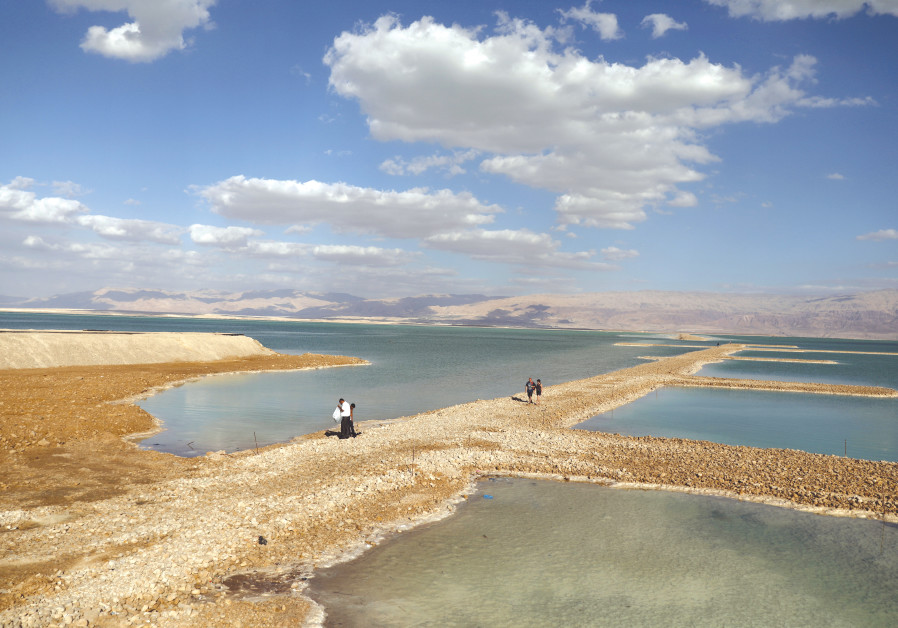Will Dead Sea explorations uncover evidence of life on Mars?

A view of the Dead Sea . (photo credit: REUTERS)
The Dead Sea may provide an answer to whether there is life on Mars. In partnership with the Dead Sea Revival Project, Israel’s new environmental non-profit is bringing awareness to the rapidly receding saltwater lake. NASA has been researching the possibility that biosignatures trapped within salt crystals could also be present on Mars. These biosignatures consist of molecules that could indicate the presence of life in the past.
The hypothesis suggests that 3.5 billion years ago Mars was covered in water. As the surface water gradually disappeared, it trickled into aquifers with extremely high salinities, an environment not unlike that of the Dead Sea – one of the saltiest water bodies on Earth – and may have supported salt-tolerant microorganisms. As the aquifers dried up, salt and other minerals crystallized, potentially trapping biosignatures within them.
This summer, a team of researchers with the Jewish Agency’s Onward Study program in Israel, were conducting research with the Dead Sea Revival Project in this area. We recently had the chance to interview Preston Tasoff, a research associate at Washington University in St. Louis who studies astrobiology, the study of the origins and habitability of life on other planets. He has been working at NASA’s Jet Propulsion Laboratory at the California Institute of Technology in Pasadena, researching if life can exist in salts on Mars. Earlier this summer Tasoff took samples from the Dead Sea, while on a motorboat excursion organized by DSRP. Tasoff met Bedein during a speaking tour of American universities organized by Hillel International.
“The Dead Sea is the ideal place to conduct research because it has been largely untouched by human activity that could contaminate DNA samples,” Tasoff said. “We seek to understand which microorganisms are living in the sea and being trapped in the salts so that one day we can answer, ‘Was there ever life on Mars and could it be trapped in salt?’”
During our interview, Tasoff explained how varying mineralogy could affect how biosignatures are preserved. As such, NASA has conducted sample testing of bodies of saltwater across the globe to widen their sample size. With so little known about the conditions on Mars several billion years ago, this is essential.
Tasoff continued by speaking on how the rapid shrinking of the Dead Sea poses a concern for further research. However, it also creates an opportunity to witness processes that occurred on Mars 3.5 billion years ago, in fast forward. As the water evaporates and is not replenished, the lake’s salinity rises, resulting in massive crystallization and creation of salt formations. Further, researchers will be able to determine if and when biosignatures degrade. Should they break down quickly, the possibility of discovering life on Mars becomes less probable.
While speaking with Tasoff, he discussed that not many people are conducting this research, since the field of astrobiology is so new. As such, the Dead Sea Revival Project has taken a particular interest in this research and its arts of visual documentation in the hopes that the Dead Sea’s importance to the scientific community may motivate conservation efforts. According to Israel’s Environmental Protection Ministry, the Dead Sea coastline has shrunk has decreased by nearly 35 meters since 1978 and continues to decrease by an average of 1.2 meters annually, threatening the potential for future breakthroughs in this field.
NASA has yet to launch a mission to collect hard data from the surface of Mars, and will not have hard evidence to support this hypothesis for some years. This makes the task of preserving the Dead Sea even more crucial.
The writers are members of the Dead Sea Revival Project. deadsearevival.org.
`; document.getElementById(“linkPremium”).innerHTML = cont; (function (v, i){ });





Comments are closed.